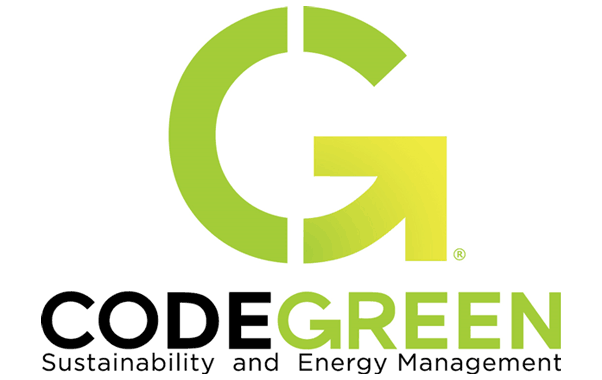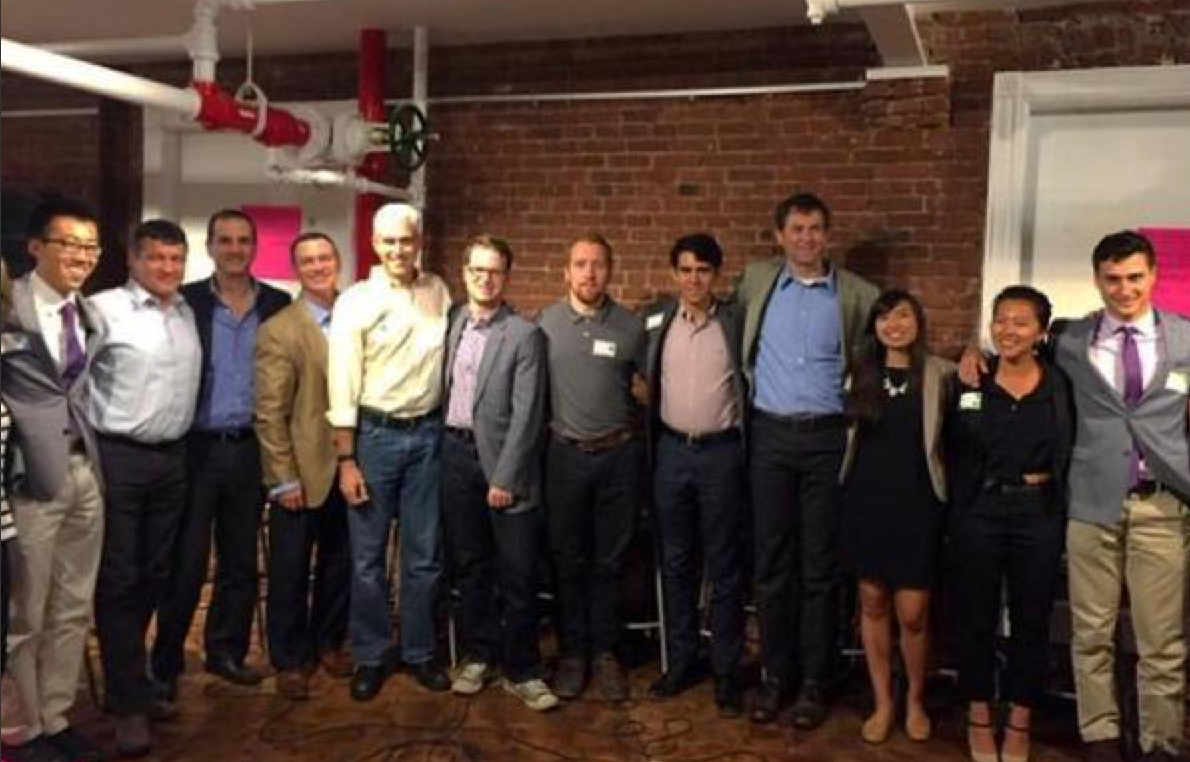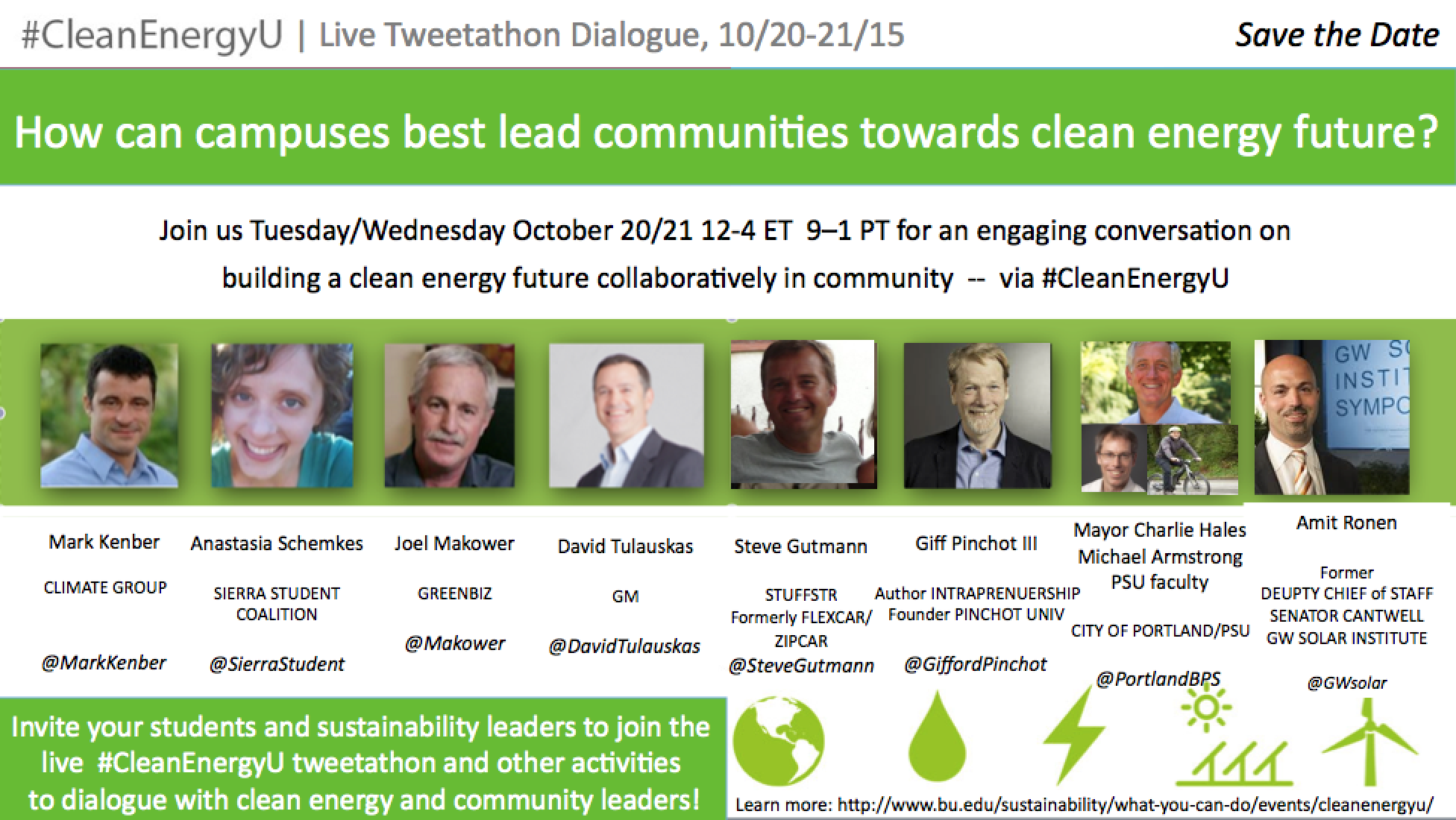Code Green Solutions


Clean energy leaders
So how do millennials envision leading towards a clean energy future? If you ask them what clean energy solutions should look like – and how to deliver them – what do they say?
Two very different #CleanEnergyU workshops – one in Valencia College, FL, with young aspiring women engineers, and another with students spanning Boston, Yale and American universities alongside clean energy leaders – convened during Climate Week NYC, asked the same clean energy questions of milliennial student leaders – and discovered the creativity that was common to their solutions!
Each individual came up with a solution for overcoming #CleanEnergyU barriers and explained how to achieve this pic.twitter.com/X2BvDB3Rt7
— CleanEnergyU (@CleanEnergyU) October 3, 2015
Andrew Winston, an NYC panelist and author of Green to Gold, believes that radical collaboration is needed to transform our energy systems and requires us each to ask: who is our neighbor and how can we collaborate with the most unlikely bedfellows in order to maximize our clean energy reach? The student leaders in NYC made their radical leadership views clear during their impressive speaker panel presentations – but it was their creative solutions which most reached beyond traditional boundaries. The NYC workshop asked, for example, why Sierra Club’s #seizethegrid students, seeking 100% renewable energy commitments for campuses, weren’t working with RE100 companies that shared the same goals? The Valencia workshop identified students’ leadership skills to help them also think out of the box to build clean energy solutions that better managed the embedded energy in our food systems.
So as the #CleanEnergyU dialogue invites students – and you – to engage in workshops like these in your own communities to hone our radical collaborative leadership skills, it’s encouraging to know that millennial clean energy leaders are thinking further out of the box than we might imagine!
Intrigued to learn more about their ideas? Read highlights from each workshop below… and join these clean energy leaders at #CleanEnergyU to dialogue with them further, including Sierra Club’s #seizethegrid team on Wednesday Oct 14 at 3 ET / 12 PT… and during our #CleanEnergyU tweetathon on Oct 20/21 from 12-4 ET / 9-1 PT.
#CleanEnergyU Workshop #1: Climate Week NYC
By Lindsey Chew, BU Intern and #CleanEnergyU Co-Convenor
The Live #CleanEnergyU Kickoff – a Green Apple Day of Service Event and Climate Week NYC affiliate event – featured a panel and interactive workshop focused on inclusive clean energy leadership for our future. On September 26 in Manhattan during Climate Week NYC, speakers included students representing Boston University, American University and Yale University alongside global clean energy leaders from General Motors, The Climate Group, Sierra Club, Second Nature, Ceres and more. Participants hailed from around the world – Manhattan, the Philippines, Denmark, Slovakia and beyond – while dozens of campuses viewed the event’s livestream online. The dialogue got its start last October on Twitter, as 11 colleges and universities celebrated their participation in the Chevrolet Campus Clean Energy Campaign, gaining over 1 million impressions in one day. Since then, the dialogue has bridged the gap between students and clean energy leaders online several times, gaining over 12 million impression and top trending on Twitter during Earth Day 2015.
“Leadership is all about inclusion,” said @LindseyChew, @sustainableBU intern and student co-designer and coordinator of #CleanEnergyU — CleanEnergyU (@CleanEnergyU) October 3, 2015
A major reason for #CleanEnergyU’s rapid success is its focus on diverse and inclusive education and leadership, extending beyond the usual choir of sustainability voices – #CleanEnergyU is an empowering new platform for global clean energy leaders and students to work together. Drawing on the social media connectivity that initially brought them together, panelists discussed the power of collaboration across boundaries, examined barriers to progress, and identified key win-win-win solutions for a cleaner energy future. The dialogue focused on leadership and collaboration, building on two core questions, “How can communities best collaborate to deliver a clean energy future?” and “How could you most effectively lead such change?”
Mark Kenber, CEO of The Climate Group, opened the discussion drawing on four key insights from the international dialogue at Climate Week NYC: the growing decentralization of energy systems, the rise of the ‘pro-sumers’ self-sufficiently producing and selling energy themselves, increasingly competitive community-owned renewable energy companies and “the enabling power of information technology connecting homes and new companies taking the lead on energy”.
Building on the idea that the means to power clean energy is shifting from utilities to decentralized consumer/producers, both Anastasia Schemkes of Sierra Student Coalition and Eban Goodstein of Bard College work to amplify the millennial voice. Anastasia asserted:
“Campuses & communities have much more power & influence on the overall electricity grid by collaborating” –@AnaSchemkes #CleanEnergyU
— CleanEnergyU (@CleanEnergyU) October 2, 2015
She mobilizes student leaders nationwide through the #SeizeTheGrid campaign which seeks 100% renewable energy on campuses by 2030 alongside Goodstein’s leadership on the Power Dialog, bringing students face-to-face with policymakers in every state capital to demand strong clean energy regulations.
Anne Kelly, Director of Policy at Ceres who also mobilizes demand for clean energy legislation through business leadership, encouraged students and leaders alike to leverage social media and acknowledge forward thinking companies like new RE100 leaders Nike and Starbucks, suggesting: “Every time you order a drink now, thank Starbucks for their solar powered lattes!”
David Tulauskas, Sustainability Director at General Motors drove this point home by making a strong business case for renewable energy, pointing towards the collaborations GM has forged with Rocky Mountain Institute and through GM’s Renewable Business Center to bring twelve companies to invest in renewable energy at scale. sustainability@BU intern and MPH candidate Chen Cao drew on his abroad experience in Kenya, noting that, in comparison to the US, many more homes and clinics were powered by cost-effective solar, challenging our nation to aspire to loftier renewable goals.
A new insight emerged from these examples – that the success of these leaders was made possible only through ‘radical collaboration’. Andrew Winston, author of Green to Gold connected the dots, saying that the deep systematic challenges we face today, such as climate change, require radical new collaborative leadership. Companies must work together to solve deep systemic challenges in unprecedented ways, setting moonshot goals for our future despite uncertainty of how to achieve them – and then build collaborative partnerships particularly between competitors, such as WalMart and Target or Coke and Pepsi in order to achieve these goals! Ryan Peters, sustainability@BU intern followed with an example of radical collaboration between business and academia from his experience as a student leader of the Chevrolet Campus Clean Energy Campaign. Ryan worked on the finance mechanisms of Boston University’s sale of carbon reductions, contributing to the 8 million tons Chevy has committed and retired. Tim Carter, President of Second Nature, the non profit organization which will now take Chevy’s legacy forward to empower more campuses to access this carbon capital, remarked that the first questions university Presidents typically ask him is how they should define their community – a question that surely opens up the kind of radical collaboration between unlikely partners that Andrew has found to be central to success.
When Sue Hall, CEO Climate Neutral Business Network, asked panelists more broadly what kind of leadership will deliver us such a clean energy future, the importance of inclusion and diversity was not forgotten, as Lindsey Chew, sustainability@BU communications intern and co-coordinator of #CleanEnergyU emphasized the need to consider and empower new voices of students and marginalized individuals all around the world via social media. Lucy Mui sustainability@BU strategy intern agreed, highlighting the untapped person-power of students, the majority of whom have yet to become involved with clean energy leadership.
Matt Goldklang of Yale University emphasized that the first, most important step is to understand what students do care about most – and work backwards from their passions for poverty alleviation, tackling asthma or any other core values – to demonstrate how a clean energy future also delivers these benefits, championing “values congruent science communications”.
So what kind of leadership is ultimately then needed? Leadership willing to be patient and take risks – as BU student leader Kyle Ortman pointed out:
“We need to put time & energy into finding individualized solutions for #CleanEnergyU” – @ortman2394 on patience and risk-taking
— CleanEnergyU (@CleanEnergyU) October 3, 2015
Students and clean energy leaders, alongside all the workshop participants, then channeled this inspiration and put their ideas to the test with an energy network workshop —combining their personal visions for clean energy future solutions into three main channels for action focused in the areas of target messaging, integrative energy communities and how to best represent the future.
Students and clean energy leaders alike came away from the first-ever in-person #CleanEnergyU kickoff workshop hopeful and inspired to make innovative partnerships a priority and engage new leaders in deliver radical clean energy solutions!
#CleanEnergyU Workshop #2: Valencia College
By Resham Shirsat, Sustainability Director
The Society of Women Engineers (SWE) is an emerging club at Valencia West Campus. In order to recruit members, the club hosted an open invitation workshop titled “What Kind of Changemaker Are You” in hopes of attracting potential future engineers hungry to solve society’s greatest environmental, social and economic challenges. The first hour of this two hour workshop included an introduction to sustainability that included our existing global challenges and possible career pathways for those interested in social change. Next, the nine student participants completed the Changemaker quiz on iPads and phones and learned about each of the six leadership styles before moving on to the main activity.
Each participant grabbed two different colored post it notes – one color representing barriers to a clean energy future and the other color representing solutions (based upon their leadership style). Students were encouraged to still record solutions they thought of even if it did not align with their particular leadership style to make sure all ideas were captured. Each participant was asked to share the barriers they identified which were then transcribed on the white board. Next each participant was asked to share their ideas for solutions and these post its were placed directly on the white board in the appropriate location along the energy grid which was drawn out prior to the activity.
At the very end these post its were collected and placed on a trifold which was going to be used later in the week at a tabling event to further recruit members and to engage in further dialogue with their peers on campus. The activity really challenged students to think critically. For example instead of simply writing “talk to your neighbors” as a solution, students were asked to go further and specifically state what they would talk to their neighbors about. In this instance, the “builder” student replied she would teach her neighbors how to grow their own food (which is otherwise a fossil fuel intensive supply chain). Her post it was placed in the community/residential section of the energy supply grid. It was interesting to see solutions like this that weren’t directly and clearly related to greening the grid but still have a significant impact on energy conservation.
—
So convene a #CleanEnergyU workshop on your campus to explore how millennias leaders will forge radical new collaborations in your campus and communities!
And join these radical #CleanEnergyU student leaders in conversation on Twitter at #CleanEnergyU, including Sierra Club’s #seizethegrid team on Wednesday Oct 14 at 3 ET 12 PT… and during our #CleanEnergyU clean energy leaders’ tweetathon on Oct 20/21 from 12-4 ET, 9-1 PT.